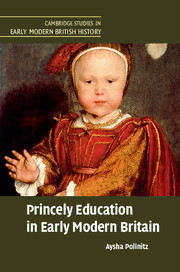
Princely Education in Early Modern Britain PDF
Preview Princely Education in Early Modern Britain
PRINCELY EDUCATION IN EARLY MODERN BRITAIN In the sixteenth century, Erasmus of Rotterdam led a humanist campaign to deter European princes from vainglorious warfare by giving them liberal educations. His prescriptions for the study of classical authors and scripture transformed the upbringing of Tudor and Stuart royal children. Rather than emphasising the sword, the educations of Henry VIII, James VI and I and their successors pri- oritised the pen. In a period of succession crises, female sovereignty and minority rulers, liberal education played a hitherto unappreci- ated role in reshaping the political and religious thought and culture of early modern Britain. This book explores how a humanist curric- ulum gave princes the rhetorical skills, biblical knowledge and polit- ical impetus to assert the royal supremacy over their subjects’ souls. Liberal education was meant to prevent over-mighty monarchy, but in practice it taught kings and queens how to extend their authority over church and state. AYSHA POLLNITZ is an Assistant Professor of History at Grinnell College. Cambridge Studies in Early Modern British History Series editors JOHN MORRILL Professor of British and Irish History, University of Cambridge, and Fellow of Selwyn College ETHAN SHAGAN Professor of History, University of California, Berkeley ALEXANDRA WALSHAM Professor of Modern History, University of Cambridge, and Fellow of Trinity College This is a series of monographs and studies covering many aspects of the history of the British Isles between the late fifteenth century and the early eighteenth century. It includes the work of established scholars and pioneering work by a new generation of scholars. It includes both reviews and revisions of major topics and books which open up new historical terrain or which reveal startling new perspectives on familiar subjects. All the volumes set detailed research within broader perspectives, and the books are intended for the use of students as well as of their teachers. For a list of titles in the series go to www.cambridge.org/earlymodernbritishhistory PRINCELY EDUCATION IN EARLY MODERN BRITAIN AYSHA POLLNITZ Grinnell College University Printing House, Cambridge CB2 8BS, United Kingdom Cambridge University Press is part of the University of Cambridge. It furthers the University’s mission by disseminating knowledge in the pursuit of education, learning and research at the highest international levels of excellence. www.cambridge.org Information on this title: www.cambridge.org/9781107039520 © Aysha Pollnitz 2015 This publication is in copyright. Subject to statutory exception and to the provisions of relevant collective licensing agreements, no reproduction of any part may take place without the written permission of Cambridge University Press. First published 2015 Printed in the United Kingdom by Clays, St Ives plc A catalogue record for this publication is available from the British Library Library of Congress Cataloguing in Publication data Pollnitz, Aysha, 1978– Princely education in early modern Britain / Aysha Pollnitz. pages cm. – (Cambridge studies in early modern British history) Includes bibliographical references and index. isbn 978-1-107-03952-0 (hardback) 1. Education, Humanistic–Great Britain–History. 2. Education of princes–Great Britain–History. 3. Renaissance–Great Britain. I. Title. lc1024.g7p65 2015 370.11′2–dc23 2014043733 ISBN 978-1-107-03952-0 Hardback Cambridge University Press has no responsibility for the persistence or accuracy of URLs for external or third-party internet websites referred to in this publication, and does not guarantee that any content on such websites is, or will remain, accurate or appropriate. For my family Contents Acknowledgements page viii Abbreviations xiii Introduction 1 1 ‘Thys boke is myne’: how humanism changed the English royal schoolroom, 1422–1509 16 2 Chivalry, ambition and bonae litterae, 1509–1533 66 3 Erasmus’ Christian prince and Henry VIII’s royal supremacy 106 4 Educating Edward VI: from Erasmus and godly kingship to Machiavelli 139 5 Fortune’s wheel and the education of early modern British queens 199 6 Education and royal resistance: George Buchanan and James VI and I 264 7 Britain’s lost Renaissance? The Stuart princes 314 Epilogue 378 Bibliography 383 Index 432 vii Acknowledgements This is a book about teachers and one that has been planted, tended and pruned by some extraordinary educators and munificent institu- tions of learning. It has been shaped particularly powerfully by Richard Serjeantson, who supervised my graduate studies and who continues to read and question my work with lucidity and generosity. He is a truly princely pedagogue. Unlike the schoolmasters described in this study, however, Richard approaches his office without ideological or meth- odological blinkers. I am cognisant of the risk and intellectual burden he assumed in encouraging me to pursue a project of this chronological range and in giving me great latitude regarding the nature of the sources I examined and the manner in which I contextualised them. I was able to study under Richard, as well as Annabel Brett and Quentin Skinner in Cambridge, because of the generosity of Cambridge Australia Scholarships, the (now sadly defunded) Overseas Research Students Awards Scheme, the Faculty of History of the University of Cambridge, and Trinity College, Cambridge. My Ph.D. examiners, Stephen Alford and the late Eric Ives, saved me from a number of errors and have been subsequent sources of advice and support. In October 2005 the master and fellows of Trinity College, Cambridge, elected me to a research fellowship that enabled me to develop an account of the relationship between the royal supremacy and liberal education in early modern Britain. The college’s generosity was matched by the convivi- ality of its members past and present. I learnt a great deal from Coulter George, Sachiko Kusukawa, Jo Miles, Geraldine Parsons, Alisha Rankin, Andrew Taylor, Tessa Webber and other distinguished scholars there. I was especially fortunate that my elector at Trinity was Patrick Collinson, who first remarked on the historical ironies that contour this study. The vol- ume of Pat’s knowledge was equalled only by the sharpness of his wit. It is a great and continuing sadness to me that I failed to complete this book during his lifetime. He is survived by Alex Walsham, whose patience, viii
